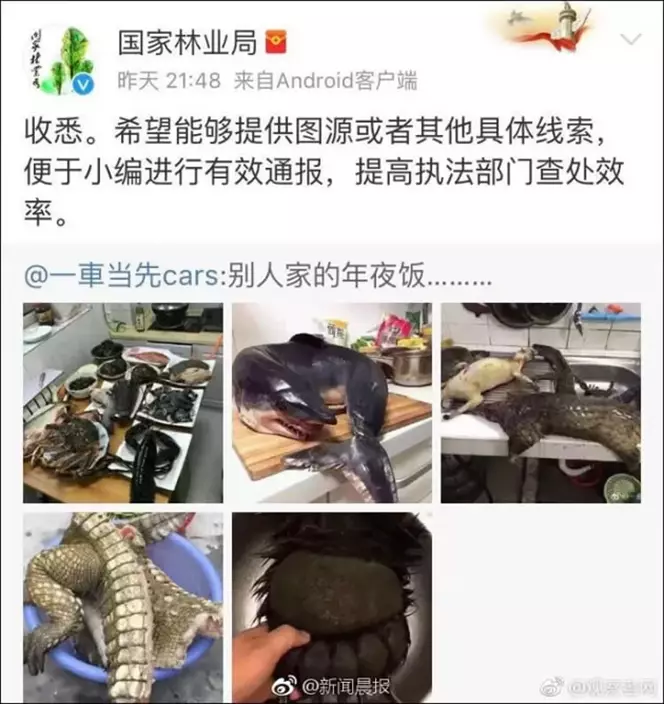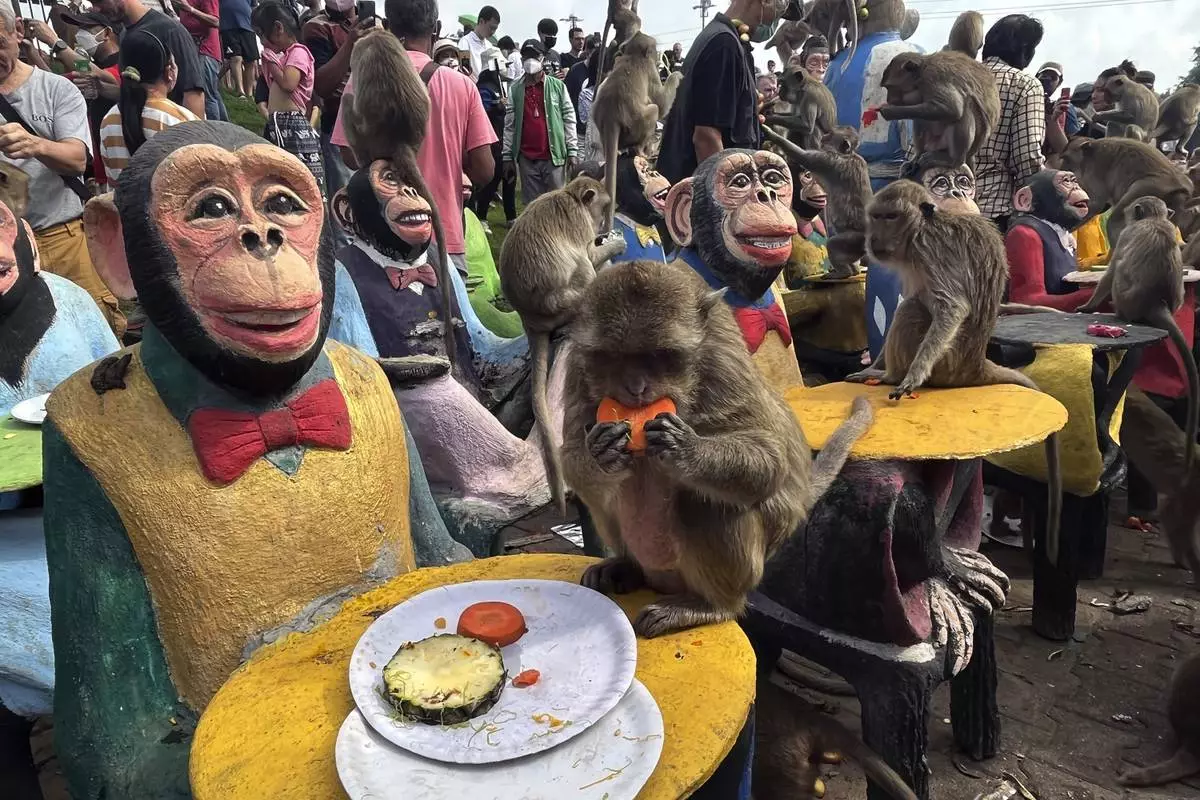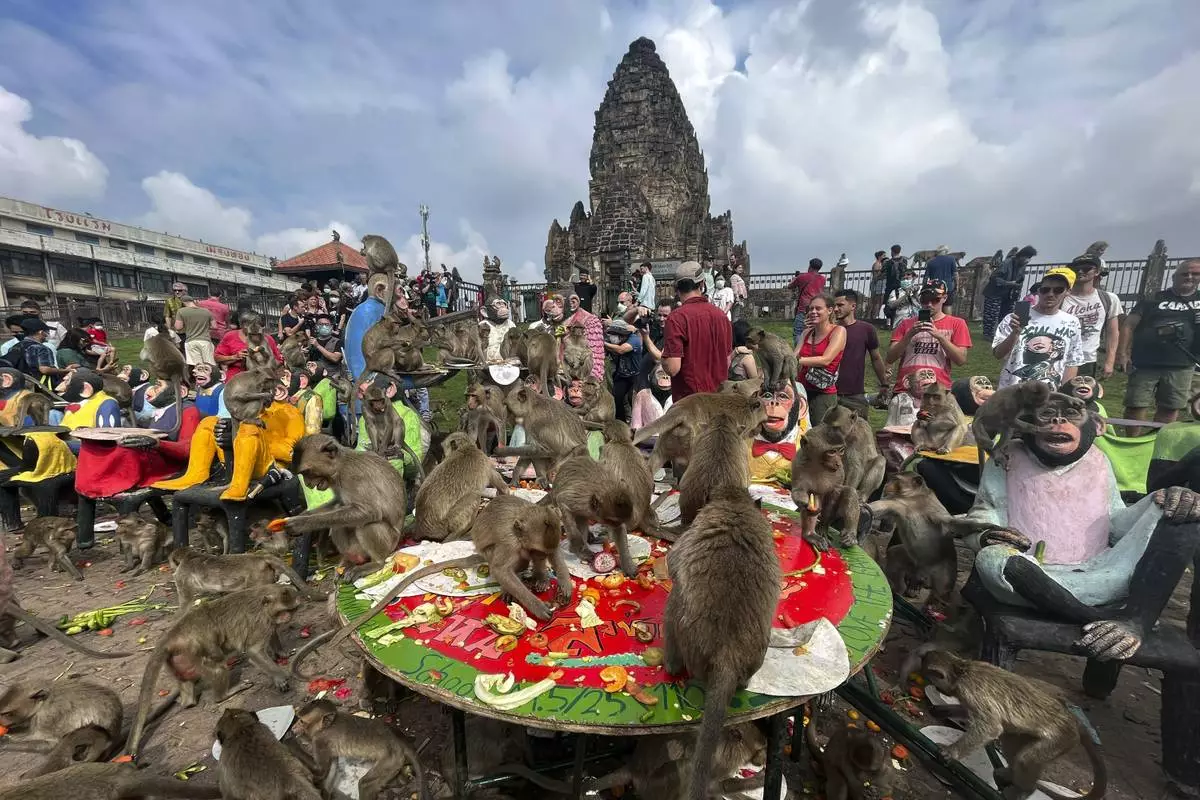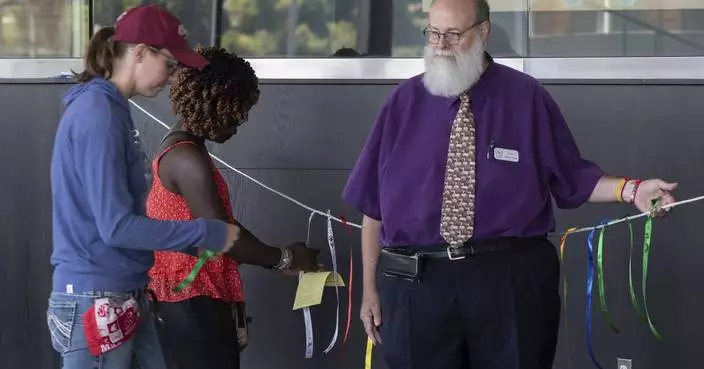Chinese New Year’s Eve is all about festive family feats, with social media in the country usually inundated with snaps of dishes people emptied to mark the Lunar New Year. However, one online prankster found himself in a pickle after posting pictures of exotic and endangered animals he claimed he had for dinner, causing a stir on China’s Twitter-like Weibo and prompting law enforcers to investigate the allegations.

Weibo Photo
The man, identified as Rao, was detained by police following a public uproar over savage pictures of rare butchered wildlife and animal body parts, some protected under Chinese law, which allegedly made up his dinner on New Year’s Eve.
The pictures, posted on February 15, feature a bear paw in a pot, crocodile meat in a plastic tub, a shark on a chopping board, a pangolin and a turtle near a sink, and an array of seafood including lobsters, crabs and sea cucumbers – most of which are traditionally considered as delicacies among Chinese people.
“Someone’s reunion dinner at home,” he captioned his post.
A good lot of the exotic animals pictured in the post are protected by law, and their trade and consumption are prohibited. However, some of these animals are seen as gourmet food in the country, and their parts still find their way to lavish banquets despite bans, owing to black markets and illegal traffickers.

Screenshot of the controversial post on Weibo which featured pictures of butchered exotic wildlife.
The Pangolin for example is under second-class state protection in China and has received the highest level of protection under the Convention on International Trade in Endangered Species of Wild Fauna and Flora (CITES). It is, however, the world's most heavily trafficked mammal.
Bears, crocodiles and around two dozen species of turtles also enjoy a protected status in China.
The now-deleted post went viral on Weibo, being shared 15,000 times in one day and triggering widespread anger. Many commented that the next dinner the man will be having would be in jail – and they were right, sort of.
China’s State Forestry Administration soon appealed via its account on Weibo for more information on the user and the accuracy of the post.
By Friday afternoon, the man had been tracked down to central China's Hunan Province and taken into custody.
Rao said the photographs were not his, and noted he either downloaded them from the Internet or copied them from posts by his friends on social media, with some having been doctored. He denied having consumed the beasts in the pictures, and said he posted them to gain more following.
"I just tried to create a popular post and win likes under the post," he confessed in an apology letter.

Screenshot of the Weibo post of the State Forestry Administration, which shared the pictures and asked the public to help trace down the source.
However, his regret did little to win clemency from the authorities, who decided to keep him for five days in detention for spreading fake information.
In a similar case over the weekend, another man, living in the southwestern province of Guizhou, found himself in the net of police after trying to sell a leopard cat online and posting a video maltreating the feline. He pleaded guilty to causing a protected animal unnecessary suffering, and was fined 3,000 yuan (around 470 US dollars) after investigators found no evidence that the cat had been sold or killed.
BANGKOK (AP) — Thai wildlife officials laid out a plan on Wednesday to bring peace to a central Thai city after at least a decade of human-monkey conflict.
The macaques that roam Lopburi are a symbol of local culture, and a major tourist draw. But after years of dangerous encounters with residents and visitors and several failed attempts to bring peace with population controls, local people and businesses have had enough.
The monkeys frequently try to snatch food from humans, sometimes resulting in tussles that can leave people with scratches and other injuries. But outrage grew in March when a woman dislocated her knee after a monkey pulled her off her feet in an effort to grab food, and another man was knocked off a motorcycle by a hungry monkey.
Authorities hope to round up some 2,500 urban monkeys and place them in massive enclosures, said Athapol Charoenshunsa, the director-general of the Department of National Parks, Wildlife and Plant Conservation. They'll work with wildlife experts to find a way for a limited number of monkeys to stay at liberty in the city, he added.
“I don’t want humans to have to hurt monkeys, and I don’t want monkeys to have to hurt humans,” he told reporters during a news conference in Bangkok.
An official monkey catching campaign was launched week, prioritizing more aggressive alpha males. It has caught 37 monkeys so far, most of whom have been placed put under the care of wildlife authorities in the neighboring province of Saraburi, while others were sent to the Lopburi zoo.
Officials said they plan to capture the rest of the monkeys once the enclosures are complete, especially those in the residential areas. Separate cages will be prepared for different troops of monkeys to prevent them from fighting.
Athapol said he expects the first phase of the operation to start within weeks, and believes the huge cages will be able to contain thousands of them and “will solve the problem very quickly.”
The monkeys are a symbol of the province, about 140 kilometers (90 miles) north of Bangkok, where the ancient Three Pagodas temple celebrates an annual “Monkey Buffet” festival, and they're commonly seen throughout the city. Macaques are classified as a protected species under Thailand’s wildlife conservation law.
Some have blamed the city's monkey troubles on tourists and residents feeding the animals, which they say drew monkeys into the city and boosted their numbers, as well as getting them accustomed to getting food from humans.
But an earlier effort to limit feeding may have made things worse, some residents say. Local officials began threatening fines for feeding monkeys outside a few designated areas around the main tourist attractions in recent years. But those feeding areas were dominated by a few troops of the highly territorial creatures, while rival bands grew hungry and turned to harassing humans in other areas for food even more.
Athapol said people shouldn’t see monkeys as villians, saying that the authorities might have not been efficient enough in their work to control the simian population.
People also need to adapt to the city’s monkeys, said Phadej Laithong, director of the Wildlife Conservation Office, explaining that a lack of natural food sources prompts the animals to find food wherever they can, including from humans.
Previous control measure have fallen short. From 2014-2023, the wildlife authorities neutered about 2,600 Lopburi monkeys.
Athapol said they are also working in other areas of Thailand that are facing problems with monkeys, such as Prajuab Kiri Khan and Phetchaburi. He said 52 of the country's 77 provinces report frequent problems from monkeys.

FILE - Monkeys eat fruit during a monkey feast festival in Lopburi province, Thailand. Sunday, Nov. 27, 2022. Thai wildlife officials laid out a plan on Wednesday, March 3, 2024, to bring peace to a central Thai town after at least a decade of human-monkey conflict. (AP Photo/Chalida EKvitthayavechnukul, File)

FILE - Monkeys eat fruit during monkey feast festival in Lopburi province, Thailand. Sunday, Nov. 27, 2022. Thai wildlife officials laid out a plan on Wednesday, March 3, 2024, to bring peace to a central Thai town after at least a decade of human-monkey conflict. (AP Photo/Chalida EKvitthayavechnukul, File)









